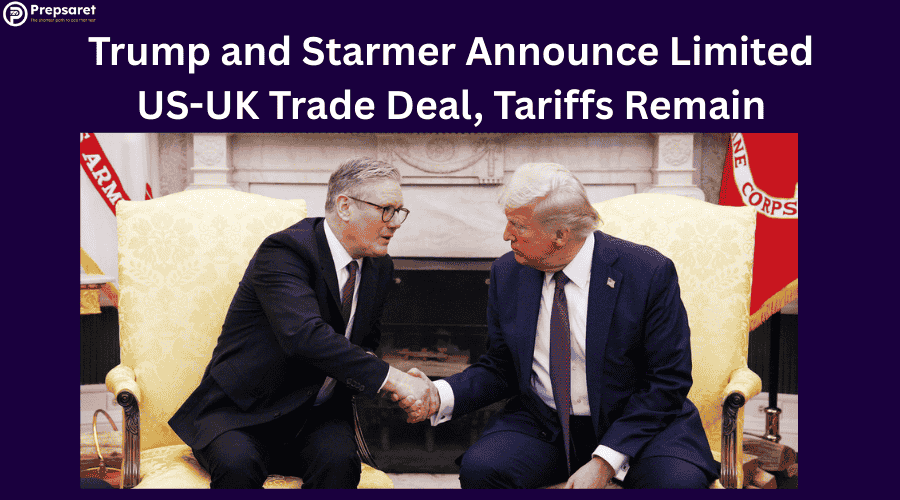Key Takeaways:
- The U.S. and U.K. announced a limited trade agreement that maintains a 10% tariff on most British exports.
- The deal expands U.S. access to the U.K. agricultural market and cuts duties on British cars, steel, and aluminum.
- Both leaders called the deal historic, but critics say major issues like digital taxes remain unresolved.
President Donald Trump and British Prime Minister Keir Starmer jointly announced a limited U.S.-U.K. trade agreement on Thursday that both leaders described as a breakthrough for jobs and market access. However, the deal keeps in place a 10% tariff on British exports, leaving larger trade issues still on the table.
Speaking from the Oval Office, Trump declared the agreement “the first of many,” as his administration seeks to expand its series of tariff negotiations worldwide. Starmer joined the announcement via speakerphone, calling the moment “historic” and emphasizing that the deal protects British jobs while boosting economic ties with the U.S.
The agreement reduces U.S. tariffs on British cars, steel, and aluminum while securing expanded market access for American beef, ethanol, and industrial products. U.K. tariffs on U.S. goods will drop from 5.1% to 1.8%, but the baseline 10% tariff on British exports to the U.S. will remain.
“This opens up tremendous market opportunities for American businesses, especially in agriculture and manufacturing,” Trump told reporters. “Britain made a good deal. Others might not get terms this favorable.”
Starmer, facing pressure to protect key U.K. industries, said the agreement was worth securing despite the remaining tariffs. “We would like to go further, but getting this deal done now helps our industries make plans with more certainty,” he said during a press briefing in London.
Recommended headlines for you
- Nvidia Adjusts H20 Chip for China to Comply With U.S. Export Rules
- Pope Leo XIV: First American Pope Addresses the World
- How Does Paying Minimum Wage Affect the Economy
Despite the progress, unresolved issues remain. The deal does not address Washington’s concerns over Britain’s 2% digital services tax on online platforms, a sticking point that U.S. officials warned could trigger future disputes.
While the announcement sparked brief optimism in financial markets, experts cautioned that broader economic uncertainty remains. Sarah Bianchi of Evercore ISI noted, “If the U.K. can’t get to zero tariffs, it’s unlikely anyone else will.”
Both leaders promised more negotiations in the coming weeks as Trump’s trade team prepares for talks with other countries, including China and members of the European Union.
The White House did not provide a timeline for finalizing the agreement but said implementation details are expected soon.

